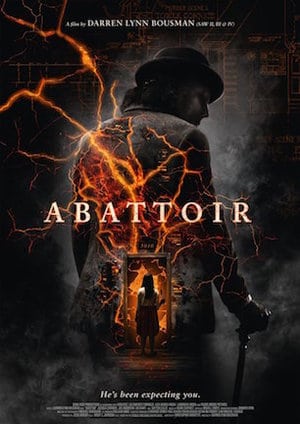
I’ve been a fan of Darren Lynn Bousman since I was 19, and going on a date to see Saw 2. Having an aversion to eye-directed violence, she hated it, whereas I was on the edge of my seat from start to end. I was with him for another 2 sequels, before he ditched the series. Next thing I know he’s releasing odd horror-musical mishmash Repo: The Genetic Opera – something I hated at first, then came to enjoy immensely. Since then he’s done an intriguing mix of features, shorts and TV work that’s been met with varying levels of acclaim and attention. Now, with the eerie Abattoir (reviewed here) he’s amped up his signature steampunk, anarchy and theatricality to make the most Bousman film yet. Recently I was lucky enough to speak with him about it, his career in general and other things horror. It’s a long read (originally intended as 2 parts), best experienced with a cup of tea. But same time, he was great chat and maybe the coolest interviwee I ever spoke to.
Enjoy.
HCF: Hello Darren – first thing I wanna say is I’m a big fan of your films.
Ah, thank you very much!
HCF: I see this one’s taken 6 years to make it to the big screen – something I imagine is a relief. During that period had the script gone through major changes?
Yeah, it’s been like 65 different movies. The idea’s always been the same though: Jebediah Crone and his house have always been there – that’s never changed. What has is the approach, the style, the dialogue and the hook into the movie. It’s funny – between this draft and the others we’ve probably written 500 pages. We could probably do a 6 part TV series from the amount that’s been written for this. There’s been numerous writers – it’s been a crazy long journey.
HCF: It’s an idea that lends itself to a franchise – what tragedies occurred in each room – is this something you’d like to see happen?
For sure, but it’s always hard. My prequel, The Dwelling was written a year and a half ago when we first finished the movie. But whether this ever happens depends on you – it depends if people like the movie. Though this was never meant to be a one film thing – it was never going to be ‘do it then go onto the next thing’. It was always meant to be a universe – meant to be a franchise. But then part of a franchise is always dictated by the success of the entry before. In a lot of respects I really hope people get to see The Dwelling because it’s a much less complex film, but also it’s a much scarier and more horrific film. And it furthers the story behind this whole mythology, behind Crone, and why it was built.
HCF: I thought it was interesting how for this first 2 thirds it’s not horror – it’s a film noir. Yet in some ways, it’s the ultimate haunted house movie.
I’d like to quote you on that: please someone take that for the poster! (Laughs). It’s funny you said that because you’ve hit 100% on what we set out to do. I said originally I wanted it to be a noir film like Seven for the first 2 acts, then Hellraiser for the last. And I think the movie does a good job of doing that – maybe down to a fault, because by the time the horror’s introduced the audience think they got it. So it’s a hard tale to get an audience to swallow if they’re immersed in this detective movie – then you’re like here’s the horror.

HCF: Then when the horror comes it really does. With Crone, here’s a villain that could go on to become genuinely iconic – like the Tall Man from Phantasm or even Pinhead. What, for you, makes a good horror bad guy?
I think I’ve been lucky in who I can work with on my films. In this one you have Calley as Jebediah Crone and before that Tobin Bell as Jigsaw. To me I think the villain has to be sympathetic. They can’t come across as a mad, screaming psychopath. I think here what works is he never really screams in Abattoir – he’s mild. He’s quiet. He’s reserved. And he’s coming from a place that when you finish the movie you see he’s coming from a relatable place. And for me you need to find something you can connect to in a villain or they’re not going to be three-dimensional.
HCF: Alongside him, you got some really cool ghosts. With it being reliant on effects, from them to the house itself, were the effects team able to truly capture the images in your head? Or did it look better than you imagined it?
I’m going to give an answer a lot of filmmakers wouldn’t, or maybe shouldn’t. But it was the worst fucking experience of my life. It was not at all what it was supposed to be. I don’t mean that like I don’t like them – I think the effects look great. But this aspect got started a long time before the film got made and there were very specific visions we had. What happened was the movie got 2 false starts so we had to start all over again and it’d literally take days to explain the ghosts, how they’d look and the concepts. Then we’d come up with designs I like, but when the movie got cancelled I couldn’t take those with me. So by the time it got made, on the third incarnation, we’d spent a lot so our budget was cut. It’s like one hand was tied behind my back at this point as opposed to what I started out with. So I’m absolutely happy but there’s a very different version we had before too.
HCF: Now I want to cover the rest of your career a bit too, but mind if I ask something I always wanted to know about Saw?
Shoot away.
HCF: Since each film acknowledged the others, was there much of a long term plan?
There was after part 3. When we made 2 we left a couple of seeds for 3. Then when we went to 4 we planted a tonne of seeds: could be words people said or writing on someone’s apartment. But when we did 4, that was literally all we did – leaving shit for the others to build on. I think it was cool, because it let us think bigger picture. I like movies that don’t fit in a perfect box – where there’s threads left open. So we said we think the audience are going to want to follow this journey even if they don’t get everything they want answered actually getting answered.
HCF: When it came to killing off Jigsaw early on, was that a bit of a debate?
Definitely, though what was even bigger was with 2 when we caught Jigsaw one page 1. I said we gotta do it because we have to be ahead of the audience and this audience is smart. It was the same there – let’s kill him now. One of the great things about working with Lionsgate and Twisted Pictures is they put trust in the audience and the filmmakers.
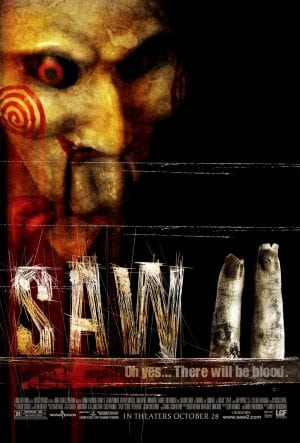
HCF: It’s been cool watching your career change . Once the fourth came out I dig that you said ‘fuck it, I’m off to make a horror musical’. Was it tricky to walk away from the series and do something as risky as Repo?
It was, and even now it’s scary to me. I often wonder, it’s like that Robert Frost poem – the path not taken or whatever: I’m drawing a blank. But I feel when I was 29 I had a fork in the road and I could have gone down one road to continue making these franchise films like Saw. I’d have had a different career – probably be wealthier and have a very different life. But I chose to go down the other path – a more uncertain one. But for me a more creatively liberating one. Because I was able to make films other people may not have made. I was able to use the success that I had off the Saw movies to do something that was wholly mine. Sometimes I wonder how it would have been.
HCF: How do you think it’d have turned out?
I tell you a story about that which makes me cry a little on the inside, but also makes me happy. I went to a premier for Lionsgate. There was me, James Gunn, Eli Roth and Rob Zombie there. And I realise these are guys getting 100 million dollar movies made while here am I struggling to get a 2 million dollar one made. But then if I’d stayed with the Saw franchise I don’t think I’d have been as happy as an artist – if I hadn’t waved my middle fingers in the air and said I’m going to make the movies I want to make now.
HCF: It’s been an unpredictable ride.
Man, I can’t tell you what it is, but the next thing I’m going to do blows everything out the water. But I’ll tell you this – it’s going to cause you to scratch your head and say ‘seriously?’
HCF: No chance of a scoop?
‘Fraid not.
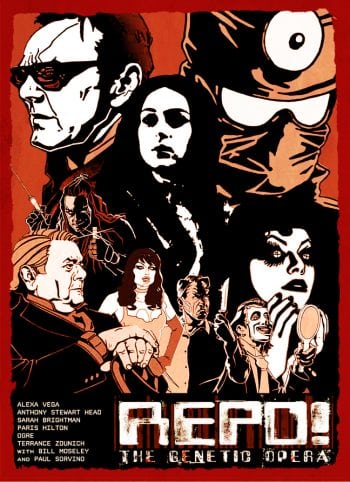
HCF: When I first saw Repo I genuinely didn’t like it, but loved it when I saw it again after. Are you drawn towards things that are uncompromising?
You’re not the first person to say that to me – I did a screening in Chicago and there was a critic I’m not going to name. But he trashed the movie – literally destroyed it. Then he walked up to me and I realised who he was. And he says after seeing it with an audience, he thought ‘holy shit, I love it’. So he went home and changed his review from ‘Darren should retire’ to ‘I’m in awe’. I think the movies I do are polarising – so you’re never going to get a ‘meh’ response.
HCF: The worst thing you can be is boring, right?
Exactly. I think that’s kind of awesome because I’d rather have a 1 star or a 10 star than a 4 or 5 star. I’m going to go back to karate kid where Miyagi says ‘right side of the road safe, left side of the road safe. Walk down the middle, get squished’. I feel my films are like that – I go down the middle and there’s no fun in that. You want to push the boundaries.
HCF: Speaking of which, so far you’ve done torture films, a demonic film, a monster movie, a remake and now a haunted house one. Are there any other types you’d like to try?
Yeah, I tell you what I’m watching now. There’s 2 films I’ve seen this year that have blown me away – when I get made at the maker like ‘why didn’t I think of this movie’. First was The Witch, which I loved.
HCF: That was excellent.
To me, that was perfect in that I left feeling depressed, upset and couldn’t believe what I just watched. And then there was The Invitation.
HCF: Also brilliant.
Wasn’t it? It was so simple: a dinner party. But you had these incredible performances. And it was like a kick in the balls seeing it: something that was more dread by the conversation, rather than spinal cords being ripped out.
HCF: Interesting, ‘cause when you first came to public attention it was through an association with what people called ‘torture porn’. Is leaving this something you’re consciously doing?
I think so – I’m proud of being in The Splat Pack: proud of the title. But that’s a stage in my life I’m no longer at. I got a kid now so my days are spent watching Finding Nemo. I’d love to make something he could see: like an adventure film. I feel like I’ve spent 15 years making movies that are depressing: now I want to do something else. It’ll always be macabre – you’ll never see me making a friendly, happy cartoon. But I want to do something that’ll appeal to a different audience. And maybe they’ll discover my other films too.
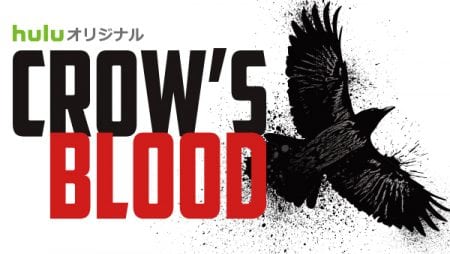
HCF: I also see your show Crow’s Blood is about to premier in Japan. Horror TV tends to be a mixed bag. There’s some great things like Bates Motel, but then a lot of the time it’s less effective.
I watch infinitely more TV than I do movies but the thing is it requires more of you. You got to a movie and it takes 90 minutes – maybe 2 hours from you. You watch TV and it’s like 13 hours of your life then maybe 6 seasons of that. So you need something that immediately grabs you. Some do – I started watching Hannibal and like that I was in. Fargo got me – same with Mr. Robot. I’m now doing Crow’s Blood – a 6 episode show, though we want to do more. I said earlier I like doing different things – well I went to Japan and did this show completely in Japanese. To me, that was something exciting.
HCF: That other road moment.
Totally – I have this extreme luck of going to weird places to do weird things. We just finished the final episode a couple of weeks ago so we don’t know about distribution, but I’d be surprised if it wasn’t available shortly after.
HCF: Cheers for speaking to us, and I wish you the best with Abattoir.
No problem – thanks.
Abattoir is out now on digital download and DVD


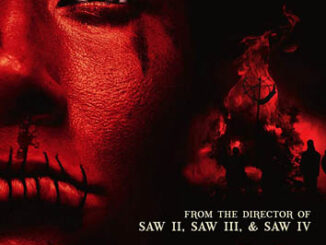

Be the first to comment